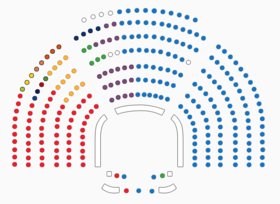Spanish senate
|
Senate Senado |
|
|---|---|
| XII Legislature | |
 |
|
| Type | |
| Type | |
| History | |
| Founded | 1837 (disband 1923-1977) 1978 (reinstituted) |
| Leadership | |
|
First Vice President
|
Pedro Sanz Alonso (PP)
|
|
Second Vice President
|
|
|
Majority leader
|
José Manuel Barreiro (PP)
|
|
Minority leader
|
Vicente Álvarez Areces (PSOE)
|
| Structure | |
| Seats | 266 |
 |
|
|
Political groups
|
Government (149)
Opposition (117) |
| Elections | |
| Limited voting | |
| Meeting place | |
 |
|
| Palacio del Senado Centro, Madrid Kingdom of Spain |
|
| Website | |
| www.senado.es | |
Government (149)
Opposition (117)
The Senate (Spanish: Senado) is the upper house of Spain's parliament, the Cortes Generales. It is made up of 265 members: 208 elected by popular vote, and 57 appointed by the regional legislatures. All senators serve four-year terms, though regional legislatures may recall their appointees at any time.
The Spanish senate was instituted by the constitution of 1837 under the regency of Maria Christina of the Two Sicilies. It remained under the regimes of the constitutions of 1845, 1856, 1869 and 1876. It was composed, at that latter time, of three main categories: senators by their own right, senators for life and senators elected. This chamber was suppressed after the coup of General Miguel Primo de Rivera in 1923.
Only after the Spanish transition to democracy in 1978 was it re-instituted.
Senators form groups along party lines. Parties with fewer than ten senators form the Mixed Group. If the membership of an existing group falls below six during a session, it is merged into the Mixed Group at the next session. For example, Coalición Canaria lost its senate caucus in 2008 after electoral losses reduced its group from six to two. The Basque Nationalist Party, falling from seven to four, "borrowed" senators from the ruling Socialist Party to form their group; in exchange, they supported the election of socialist Javier Rojo as President of the Senate. The PNV group is again under threshold after returning the borrowed Socialists, and it faces dissolution after the current session.
Legally, 133 seats are required for an absolute majority, vacant seats notwithstanding.
...
Wikipedia
